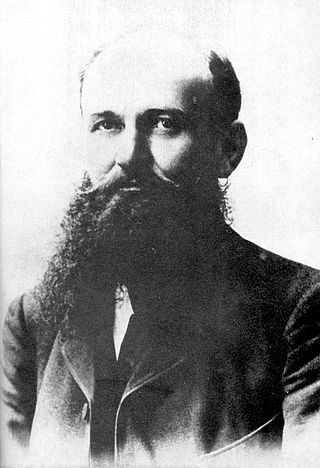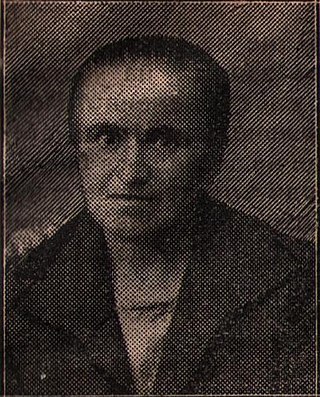
The Internal Macedonian Revolutionary Organization, was a secret revolutionary society founded in the Ottoman territories in Europe, that operated in the late 19th and early 20th centuries.

The Ilinden–Preobrazhenie Uprising, or simply the Ilinden Uprising of August–October 1903, was organized revolt against the Ottoman Empire, which was prepared and carried out by the Internal Macedonian-Adrianople Revolutionary Organization, with the support of the Supreme Macedonian-Adrianople Committee, which included mostly Bulgarian military personnel. The name of the uprising refers to Ilinden, a name for Elijah's day, and to Preobrazhenie which means Transfiguration. Some historians describe the rebellion in the Serres revolutionary district as a separate uprising, calling it the Krastovden Uprising, because on September 14 the revolutionaries there also rebelled. The revolt lasted from the beginning of August to the end of October and covered a vast territory from the western Black Sea coast in the east to the shores of Lake Ohrid in the west.

Georgi Nikolov Delchev, known as Gotse Delchev or Goce Delčev, was an important Macedonian Bulgarian revolutionary (komitadji), active in the Ottoman-ruled Macedonia and Adrianople regions at the turn of the 20th century. He was the most prominent leader of what is known today as the Internal Macedonian Revolutionary Organization (IMRO), a secret revolutionary society that was active in Ottoman territories in the Balkans at the end of the 19th and the beginning of the 20th century. Delchev was its representative in Sofia, the capital of the Principality of Bulgaria. As such, he was also a member of the Supreme Macedonian-Adrianople Committee (SMAC), participating in the work of its governing body. He was killed in a battle with an Ottoman unit on the eve of the Ilinden-Preobrazhenie uprising.

The Macedonian Struggle was a series of social, political, cultural and military conflicts that were mainly fought between Greek and Bulgarian subjects who lived in Ottoman Macedonia between 1893 and 1912. The conflict was part of a wider rebel war in which revolutionary organizations of Greeks, Bulgarians and Serbs all fought over Macedonia. Gradually the Greek and Bulgarian bands gained the upper hand. Though the conflict was largely pacified by the Young Turk Revolution, it remained a low intensity insurgency until the Balkan Wars.

Damyan Yovanov Gruev was а Bulgarian teacher, revolutionary and insurgent leader in the Ottoman regions of Macedonia and Thrace. He was one of the six founders of the Internal Macedonian Revolutionary Organization. Per the Macedonian historiography, he was an ethnic Macedonian. He's considered a national hero in Bulgaria and North Macedonia.

Gyorche Petrov Nikolov born Georgi Petrov Nikolov, was a Bulgarian teacher and revolutionary, one of the leaders of the Internal Macedonian Revolutionary Organization (IMRO). He was their representative in Sofia, the capital of Principality of Bulgaria. As such he was also a member of the Supreme Macedonian-Adrianople Committee (SMAC), participating in the work of its governing body. During the Balkan Wars, Petrov was a Bulgarian army volunteer, and during the First World War, he was involved in the activity of the Bulgarian occupation authorities in Serbia and Greece. Subsequently, he participated in Bulgarian politics, but was eventually killed by the rivaling IMARO right-wing faction. According to the Macedonian historiography, he was an ethnic Macedonian.

Ivan Garvanov was a Bulgarian revolutionary and leader of the revolutionary movement in Ottoman Macedonia and Southern Thrace.

Petar Chaulev was a Bulgarian revolutionary in Ottoman Macedonia. He was a local Bulgarian leader of the Internal Macedonian Revolutionary Organization (IMRO).

Alexandar Protogerov was a Bulgarian general, politician and revolutionary, as well as a member of the revolutionary movement in Macedonia, Thrace and Pomoravlje. Protogerov was a Bulgarian Freemason and held a leading position in the lodge where he was a member.

The Kresna–Razlog Uprising named by the insurgents the Macedonian Uprising, was a Bulgarian uprising against the Ottoman rule, predominantly in the areas of today Pirin Macedonia in late 1878 and early 1879. It broke out following the protests and spontaneous opposition to the decisions of the Congress of Berlin, which, instead of ceding the Bulgarian-populated parts of Macedonia to the newly reestablished Bulgarian suzerain state per the Treaty of San Stefano, returned them to Ottoman control. It was prepared by the Unity Committee. The rebellion was supported by detachments which had infiltrated the area from the Principality of Bulgaria. As a result of disagreement within its leadership, the uprising lost its initial successful curse and was crushed by the Ottoman army.

The history of Macedonians has been shaped by population shifts and political developments in the southern Balkans, especially within the region of Macedonia. The ideas of separate Macedonian identity grew in significance after the First World War, both in Vardar and among the left-leaning diaspora in Bulgaria, and were endorsed by the Comintern. During the Second World War these ideas were supported by the Communist Partisans, but the decisive point in the ethnogenesis of this South Slavic people was the creation of the Socialist Republic of Macedonia after the World War II, as a new state in the framework of the Socialist Federal Republic of Yugoslavia.

Hristo Dimitrov Uzunov was a Macedonian Bulgarian teacher and revolutionary, head of the Ohrid branch of the Internal Macedonian Revolutionary Organization and its ideological leader in the Ohrid region.

Hristo Silyanov was a Bulgarian revolutionary, historian and memoirist. He was among the activists of the Bulgarian Macedonian-Adrianople Revolutionary Committees and in his memoirs uniquely described the history of the organization in its early period.

North Macedonia, officially the Republic of North Macedonia, is a landlocked country in Southeast Europe. It shares land borders with Kosovo to the northwest, Serbia to the north, Bulgaria to the east, Greece to the south, and Albania to the west. It constitutes approximately the northern third of the larger geographical region of Macedonia. Skopje, the capital and largest city, is home to a quarter of the country's 1.83 million people. The majority of the residents are ethnic Macedonians, a South Slavic people. Albanians form a significant minority at around 25%, followed by Turks, Romani, Serbs, Bosniaks, Aromanians and a few other minorities.

Lazar Poptraykov was a Macedonian Bulgarian revolutionary (komitadji). He was also a Bulgarian Exarchate teacher and poet from Ottoman Macedonia. He was one of the leaders of the Internal Macedonian-Adrianople Revolutionary Organization (IMARO) in the region of Kastoria (Kostur) during the Ilinden Uprising. Despite his Bulgarian identification, per the post-WWII Macedonian historiography he was as an ethnic Macedonian.

Metody Patchev was a Bulgarian teacher and revolutionary, vojvoda of the Internal Macedonian-Adrianople Revolutionary Organization. According to the post-WWII Macedonian historiography, he was an ethnic Macedonian.

Bulgarian Millet was an ethno-religious and linguistic community within the Ottoman Empire from the mid-19th to early 20th century. The semi-official term Bulgarian millet, was used by the Sultan for the first time in 1847, and was his tacit consent to a more ethno-linguistic definition of the Bulgarians as a nation. Officially as a separate Millet in 1860 were recognized the Bulgarian Uniates, and then in 1870 the Bulgarian Orthodox Christians. At that time the classical Ottoman Millet-system began to degrade with the continuous identification of the religious creed with ethnic identity and the term millet was used as a synonym of nation. In this way, in the struggle for recognition of a separate Church, the modern Bulgarian nation was created. The establishment of the Bulgarian Exarchate in 1870, meant in practice official recognition of a separate Bulgarian nationality, and in this case the religious affiliation became a consequence of national allegiance. The founding of an independent church, along with the revival of Bulgarian language and education, were the crucial factors that strengthened the national consciousness and revolutionary struggle, that led to the creation of an independent nation-state in 1878.

Kostadina Evtimova Boyadzhieva—Rusinska was a Bulgarian teacher, feminist and revolutionary.

Svoboda ili smart, written in pre-1945 Bulgarian orthography: "Свобода или смърть" and before 1899: "Свобода или смъртъ", was a revolutionary slogan used during the national-liberation struggles by the Bulgarian revolutionaries, called comitadjis. The slogan was in use during the second half of the 19th and the first half of the 20th centuries.
Andon Hristov Zlatarev, under the name Ivan or Gorov Todorov Zlaterev, was a Bulgarian revolutionary, an activist of the Internal Macedonian-Adrianople Revolutionary Organization (IMARO).


















